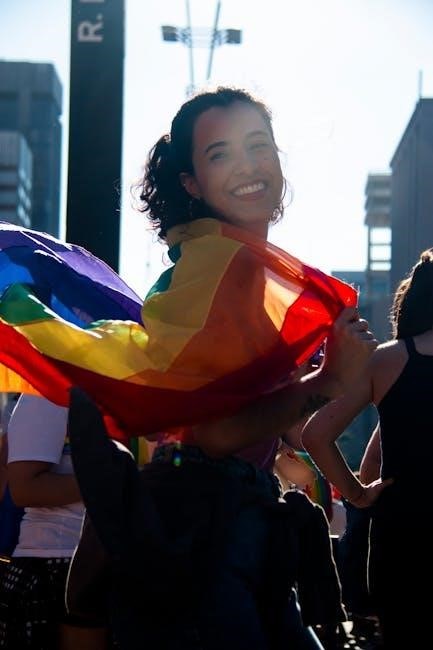Hunger by Roxane Gay is a raw, unflinching memoir exploring body image, trauma, and self-acceptance. Gay shares her personal journey of using food to cope with pain and societal expectations, offering a deeply human perspective on weight, identity, and resilience.
1.1 Overview of the Book
Hunger: A Memoir of (My) Body by Roxane Gay is a deeply personal and unflinching exploration of body image, trauma, and self-acceptance. The book delves into Gay’s experiences with weight, societal expectations, and the emotional scars of her past. Rather than a traditional triumph narrative, Hunger offers a raw, honest account of her relationship with food and her body. Gay examines how she used food as a coping mechanism for trauma and discusses the societal pressures that shape perceptions of obesity. With remarkable candor, she challenges stereotypes and invites readers to reflect on their own relationships with their bodies. The memoir is both a personal journey and a broader commentary on identity, resilience, and the complexities of human experience.
1.2 Roxane Gay’s Background and Writing Style
Roxane Gay, a New York Times bestselling author, brings her unique voice to Hunger, blending intimacy and sensitivity. Her writing style is characterized by unflinching honesty and emotional depth, drawing from her personal struggles with body image and trauma. Gay’s background as a feminist writer and her ability to explore shared anxieties over consumption and health make her perspective both relatable and impactful. Her prose is both evocative and accessible, allowing readers to connect deeply with her experiences. Through her work, Gay challenges societal norms and offers a powerful narrative that resonates with readers globally, making her one of the most influential voices in contemporary literature.
1.3 The Significance of the Title “Hunger”
The title Hunger reflects Roxane Gay’s exploration of physical and emotional starvation. It symbolizes her longing for safety, acceptance, and understanding, while also highlighting societal hunger for conformity. The title encapsulates her journey of self-discovery and healing, emphasizing the universal struggle with body image and identity. Through this title, Gay conveys the profound impact of trauma and the enduring quest for self-acceptance, making it a poignant and fitting choice for her memoir.

Themes Explored in “Hunger”
In Hunger, Roxane Gay explores themes of body image, trauma, food as coping, self-acceptance, and societal expectations, offering a raw look at identity and resilience.
2.1 Body Image and Self-Perception
In Hunger, Roxane Gay delves into her complex relationship with body image, describing her body as “wildly undisciplined” and sharing her struggles with self-perception. She explores how societal expectations of beauty and size have shaped her identity, often leading to feelings of humiliation and inadequacy. Gay reflects on the tension between desiring acceptance and the harsh realities of fatphobia, offering a poignant examination of how body image influences self-worth. Her narrative highlights the emotional and psychological toll of living in a body that does not conform to societal norms, while also challenging readers to rethink their assumptions about weight and identity.
2.2 Trauma and Its Impact on Eating Habits
In Hunger, Roxane Gay reveals how childhood trauma profoundly shaped her relationship with food and her body. She recounts using eating as a coping mechanism to deal with emotional pain, leading to significant weight gain. Gay describes how food became both a source of comfort and a means of self-protection, as she sought to make herself “unseen” in a world that often felt unsafe. Her narrative explores the deep psychological connection between trauma, eating habits, and body size, offering a raw and unflinching look at how pain can manifest physically and emotionally. This theme underscores the memoir’s exploration of resilience and survival.
2.3 Food as a Coping Mechanism

In Hunger, Roxane Gay vividly illustrates how food became her primary coping mechanism for emotional pain. After experiencing childhood trauma, she turned to eating as a way to fill the void and protect herself from further harm. Food provided temporary comfort, but it also led to a complex relationship with her body. Gay describes how eating became an act of both self-care and self-destruction, highlighting the emotional and psychological layers behind her choices. This theme resonates deeply, as it explores how trauma can lead to using food as a survival strategy, even when it perpetuates cycles of guilt and shame. Her honesty sheds light on the universal struggle of seeking solace in consumption.
2.4 The Struggle for Self-Acceptance
In Hunger, Roxane Gay poignantly captures her lifelong struggle for self-acceptance in a society that rejects bodies like hers. She describes her body as “wildly undisciplined,” reflecting the internalized shame and societal expectations she faces. Gay’s journey is marked by a constant tension between wanting to be seen and needing to hide, as she grapples with the humiliation of not fitting into the narrow standards of beauty; Her story highlights the emotional toll of living in a body that is perpetually judged and marginalized. Through her unflinching honesty, Gay challenges readers to confront the ways societal norms distort self-perception and the importance of embracing one’s true self, flaws and all. Her struggle resonates deeply, offering a powerful exploration of identity and resilience.
2.5 Societal Expectations and Body Shaming
Roxane Gay vividly portrays the suffocating impact of societal expectations and body shaming in Hunger. She recounts how her body, deemed unacceptable by societal standards, has been a source of constant humiliation and judgment. Gay highlights the hypocrisy of a culture that both fetishizes thinness and shames those who do not conform, creating a cycle of self-loathing and alienation. Her experiences reveal the profound emotional scars left by fatphobia and the relentless pressure to fit into an unattainable ideal. Through her story, Gay challenges readers to recognize the harm inflicted by these expectations and to question the systems that perpetuate body shaming, advocating for a more inclusive and compassionate understanding of diverse bodies. Her voice is both a personal testament and a call to action.
Roxane Gay’s Personal Journey
Roxane Gay shares her deeply personal journey of trauma, self-discovery, and resilience in Hunger. Her story explores the emotional and physical transformation shaped by pain, food, and societal pressures.
3.1 Childhood Trauma and Its Aftermath
Roxane Gay recounts her childhood trauma, including a life-altering sexual assault, which profoundly shaped her relationship with food and her body. This event led her to use eating as a coping mechanism, seeking comfort and protection through weight gain. The trauma instilled a deep-seated fear and humiliation, influencing her self-perception and eating habits. Gay vividly describes how her body became a source of both safety and confinement, reflecting the emotional scars of her past. Her journey highlights the long-term psychological and physical impact of childhood trauma, emphasizing the struggle to reconcile her body image with societal expectations and personal acceptance.
3.2 The Role of Food in Her Life
Roxane Gay reveals how food became a source of both comfort and control in her life. Following childhood trauma, she turned to eating as a coping mechanism, using it to fill emotional voids and protect herself from further harm. Food symbolized safety and escape, yet it also led to feelings of guilt and shame. Gay describes her complex relationship with eating, highlighting how it became a double-edged sword—providing temporary solace while exacerbating her struggles with body image. Over time, she began to reevaluate her relationship with food, seeking to balance nourishment with self-care and acceptance, rather than using it as a means of survival or concealment.
3.3 Experiences with Weight and Body Image
Roxane Gay openly discusses her lifelong struggles with weight and body image, describing her body as “wildly undisciplined.” She recounts how societal expectations and fatphobia have shaped her self-perception, often leading to feelings of shame and invisibility. Gay’s weight has been both a source of protection and a target for judgment, reflecting the broader cultural stigma surrounding obesity. Her journey highlights the emotional toll of living in a body that does not conform to societal ideals, while also emphasizing her efforts to reclaim and accept herself amidst these challenges. Her story resonates deeply with those who have faced similar struggles with body image and identity.
3.4 The Process of Healing and Self-Discovery
Roxane Gay’s memoir delves into her complex journey of healing and self-discovery, marked by a raw exploration of her relationship with her body and past traumas. She confronts the emotional scars of her childhood and the societal pressures that shaped her self-perception. Through her writing, Gay seeks to reclaim her narrative, challenging the stigma surrounding obesity and promoting self-acceptance. Her journey is not linear, reflecting the messy, ongoing nature of healing. By sharing her struggles openly, Gay offers readers a powerful reminder of the importance of confronting pain and embracing one’s true self, even in the face of societal judgment and internalized shame.
Societal and Cultural Context
Roxane Gay’s memoir critiques societal norms and cultural expectations surrounding body image, fatphobia, and gender roles, highlighting how these factors shape individual experiences of identity and self-perception.

4.1 Fatphobia and Discrimination
Roxane Gay’s memoir sheds light on the pervasive fatphobia and discrimination faced by individuals in a society obsessed with thinness. Gay recounts her experiences of humiliation and marginalization, emphasizing how societal norms equate body size with worth. She critiques the systemic discrimination embedded in cultural attitudes, workplace dynamics, and public spaces, where fat individuals are often invisible or shamed. Gay’s narrative underscores the emotional toll of constant judgment, highlighting how fatphobia intersects with gender and race, further isolating marginalized bodies. Her unflinching account challenges readers to confront their biases and recognize the humanity of all bodies, regardless of size or societal expectations.
4.2 The Impact of Gender on Body Image
Roxane Gay examines how gender shapes societal expectations of body image, particularly for women. She highlights the pressure on women to conform to unrealistic beauty standards, emphasizing thinness and youth. Gay discusses how these expectations exacerbate body image struggles, creating a cycle of self-doubt and shame. She also explores how gender roles complicate relationships with food and weight, often framing women’s bodies as objects of scrutiny. Gay’s narrative reveals the emotional toll of navigating these gendered norms, emphasizing the need for a more inclusive understanding of beauty and identity. Her perspective challenges readers to question and dismantle harmful stereotypes perpetuated by society.
4.3 The Diet Culture and Its Effects
Roxane Gay critiques the pervasive diet culture, highlighting its damaging effects on mental and physical health. She explores how societal pressure to conform to unrealistic beauty standards fosters guilt and shame around eating. Gay discusses the emotional toll of constant dieting, the cycle of restriction and bingeing, and the failure of diets to provide lasting solutions. She argues that diet culture perpetuates self-loathing, particularly for women, and distracts from addressing the root causes of disordered eating. Gay’s critique challenges readers to rethink their relationship with food and their bodies, advocating for self-acceptance over societal expectations. Her insights resonate deeply, offering a powerful commentary on the cultural obsession with weight loss.
4.4 Media Representation of Different Body Types
Roxane Gay addresses the lack of diverse body representation in media, emphasizing how fat bodies are often marginalized or misrepresented. She highlights the humiliation and invisibility she has felt due to societal norms that equate thinness with worthiness. Gay critiques the media’s role in perpetuating negative stereotypes, where fat individuals are frequently portrayed as lazy, unattractive, or comedic figures. This limited representation, she argues, reinforces self-loathing and internalized fatphobia. By sharing her experiences, Gay challenges the media’s narrow narratives, advocating for greater inclusivity and acceptance of all body types. Her work underscores the importance of diverse representation in fostering self-acceptance and dismantling harmful stereotypes.

Reception and Impact of “Hunger”
Hunger has received widespread critical acclaim and commercial success, resonating deeply with readers for its raw honesty on body image and trauma, impacting contemporary identity conversations.
5.1 Critical Acclaim and Reviews
Hunger has garnered widespread critical acclaim for its unflinching honesty and emotional depth. Reviewers praise Roxane Gay’s intimate storytelling, highlighting her ability to confront body image, trauma, and societal expectations with vulnerability and courage. The memoir has been described as a “searingly honest” exploration of food, weight, and self-image, resonating deeply with readers. Critics commend Gay’s writing style, noting its clarity and emotional resonance, which makes the book both thought-provoking and deeply personal. The memoir’s raw candor has earned it a place in contemporary conversations about identity, making it a significant work in modern literature. Its impact lies in its ability to challenge societal norms and foster empathy.
5.2 Commercial Success and Popularity
Hunger achieved significant commercial success, becoming a New York Times bestseller and resonating with a wide audience. Its availability in formats like Kindle and PDF contributed to its accessibility. With over 7,500 ratings on Amazon, the memoir holds a 4.4-star rating, reflecting its popularity. Readers praised its readability, emotional depth, and unflinching honesty, making it a favorite among those seeking raw, personal narratives. The book’s success underscores its relevance in contemporary conversations about weight, identity, and societal expectations, solidifying its place as a widely read and impactful work in modern literature.
5.3 Reader Responses and Personal Connections

Readers deeply connected with Hunger, finding solace in Gay’s unflinching honesty. Many shared personal struggles with weight and trauma, resonating with her journey. The memoir’s raw portrayal of body image and societal pressures struck a chord, fostering empathy and understanding. Some readers praised its cathartic nature, while others appreciated its ability to challenge preconceived notions about obesity. The book’s impact lies in its relatability, offering readers a mirror to their own experiences and validating their emotions. Gay’s vulnerability created a space for open dialogue, making Hunger a deeply personal and transformative read for many.
5.4 The Book’s Role in Contemporary Conversations
Hunger has become a pivotal voice in modern discussions about body positivity, fatphobia, and mental health. Gay’s unflinching narrative challenges societal norms, sparking essential conversations about acceptance and resilience. The memoir’s impact extends beyond literature, influencing broader cultural dialogues on identity and self-care. By sharing her story, Gay has empowered others to confront their own struggles, fostering a more inclusive and compassionate society. Hunger remains a cornerstone in contemporary discourse, urging readers to rethink their perceptions of bodies and trauma, and to advocate for a world that embraces diversity and promotes healing.
Hunger leaves a lasting impact, offering a raw exploration of body image, trauma, and self-acceptance. Roxane Gay’s unflinching honesty resonates deeply, inspiring reflection and fostering empathy in readers.
6.1 The Lasting Legacy of “Hunger”
Hunger has left an indelible mark on contemporary literature and cultural conversations. Roxane Gay’s unflinching honesty about body image, trauma, and self-acceptance has resonated globally, sparking essential discussions about weight, identity, and societal expectations. The memoir’s raw, emotional depth has made it a pivotal work in challenging fatphobia and promoting empathy. Its accessibility in formats like PDF has further amplified its reach, ensuring its message continues to inspire and educate. Gay’s courage in sharing her story has not only changed individual perspectives but also contributed to a broader shift in how society views and discusses bodies, solidifying Hunger as a timeless and transformative work.

6.2 Final Thoughts on the Memoir’s Significance
Hunger stands as a testament to the power of vulnerability and truth-telling. Roxane Gay’s memoir is not just a personal narrative but a cultural critique, challenging societal norms around body image and trauma. Its significance lies in its ability to connect individual experiences to broader societal issues, fostering empathy and understanding. The PDF version has made this vital work accessible to a global audience, ensuring its impact endures. Gay’s unflinching honesty has created a space for marginalized voices, proving that stories of pain and resilience can inspire healing and change. Hunger is a beacon of hope and a call to reevaluate how we perceive and treat bodies, leaving a lasting impact on readers worldwide.